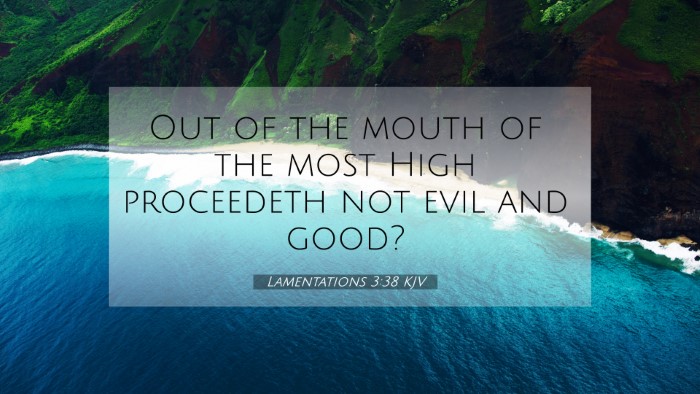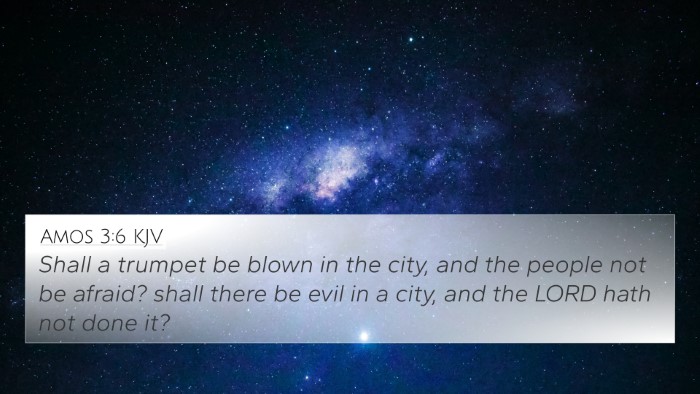Lamentations 3:38 - Understanding the Verse
Bible Verse: Lamentations 3:38
This verse states, “Is it not from the mouth of the Most High that both calamities and good things come?” This passage speaks to the sovereignty of God over all circumstances in life, conveying that both blessings and misfortunes are permitted by His divine will.
Combined Insights from Public Domain Commentaries
This insight draws from the collective wisdom of renowned commentaries:
- Matthew Henry: Henry emphasizes the idea that all events that occur, whether favorable or adverse, are under God's ultimate control. He highlights that it’s essential to remember God's hand in both tribulations and joys.
- Albert Barnes: Barnes points out that the statement serves to remind the reader that God’s providence is universal. He asserts that it encourages believers to trust God’s plan amidst their suffering and to acknowledge His goodness despite hardships.
- Adam Clarke: Clarke interprets this verse as a call to recognize God's overarching authority. He notes that the duality of ‘calamities and good things’ acts as a reminder of the balance inherent in life as guided by divine wisdom.
Theological Implications
This verse fosters important theological reflections:
- Divine Sovereignty: It teaches that God governs all aspects of life, which extends to sufferings and blessings.
- Human Suffering: The verse encourages believers to see their challenges as part of God’s broader plan.
- Trust in God's Goodness: Despite experiencing difficulties, the verse prompts believers to hold on to their faith in God's essential goodness.
Connections to Other Bible Verses
Understanding Lamentations 3:38 can be enhanced through its connections to other scriptures. Here are some pertinent cross-references:
- Isaiah 45:7: “I form the light and create darkness, I make peace and create evil: I, the Lord, do all these things.” This verse further emphasizes God’s control over good and bad outcomes.
- Romans 8:28: “And we know that in all things God works for the good of those who love him, who have been called according to his purpose.” This shows that all happenings, including suffering, contribute to a larger divine purpose.
- James 1:17: “Every good gift and every perfect gift is from above, coming down from the Father of lights.” This verse underscores the theme of goodness that stems from God.
- Psalm 119:68: “You are good, and do good; teach me your statutes.” Here, the psalmist acknowledges God's intrinsic goodness despite adversity.
- 1 Peter 5:10: “And after you have suffered a little while, the God of all grace... will himself restore, confirm, strengthen, and establish you.” This speaks to the eventual restoration after trials.
- Lamentations 3:22-23: “The steadfast love of the Lord never ceases; his mercies never come to an end; they are new every morning; great is your faithfulness.” This connects to hope amidst the calamities mentioned earlier in the chapter.
- Job 2:10: “Shall we receive good at the hand of God, and shall we not receive evil?” Job’s response emphasizes the acceptance of both good and bad as part of God’s sovereignty.
Practical Applications
This verse serves as a practical guideline for believers:
- Trust in Adversity: Maintains faith during difficult times, fostering resilience.
- Gratitude in Good Times: Encourages a grateful heart, recognizing that blessings ultimately come from God.
- Develop a Balanced Perspective: Cultivates understanding that life’s experiences vary and that God is involved in all aspects.
Using Cross-References in Bible Study
For those interested in deepening their study:
- Explore Themes: Identify other verses that discuss themes of suffering and divine providence.
- Bible Concordance: Use tools such as a Bible concordance to find related scriptures.
- Comparative Analysis: Observe how Old Testament texts relate to New Testament teachings.
- Thematic Connections: Look for passages that support and elucidate the meanings in Lamentations 3:38.
Conclusion
Lamentations 3:38 invites believers to remember God's sovereignty in both the calamities and good things in life. This verse, enriched by commentary insights and other scriptural cross-references, encourages a deepened faith and understanding of God’s majestic plan. Through linking and comparing scripture, believers can reinforce their understanding of the divine narrative woven throughout the Bible.
Using cross-referencing tools and exploring thematic connections will further enhance one’s studies, fostering a richer dialogue between Biblical texts. Ultimately, as believers navigate life’s ups and downs, faith in God's goodness remains a central tenet of their journey.








